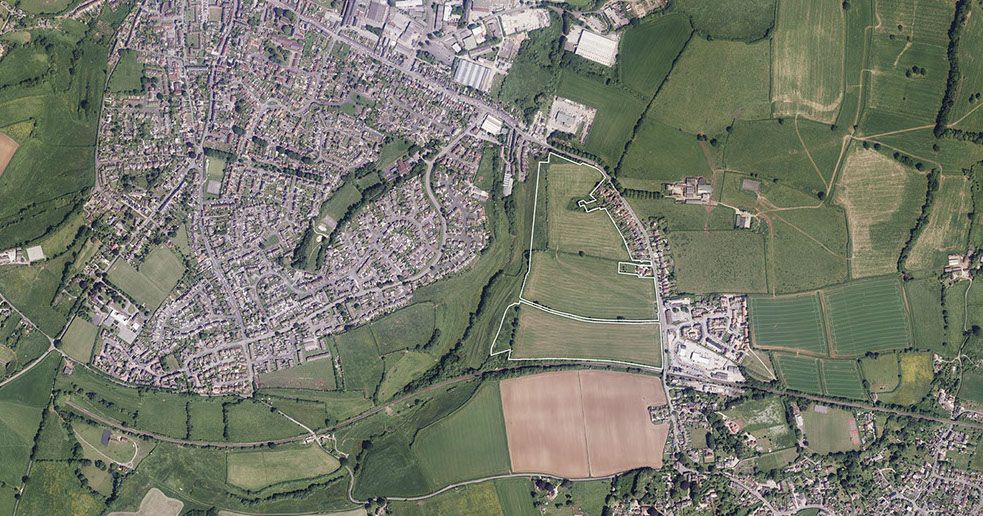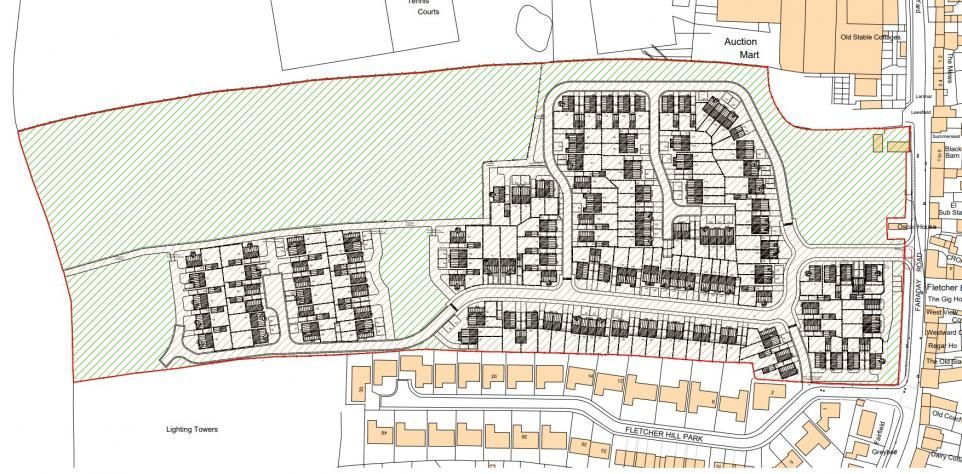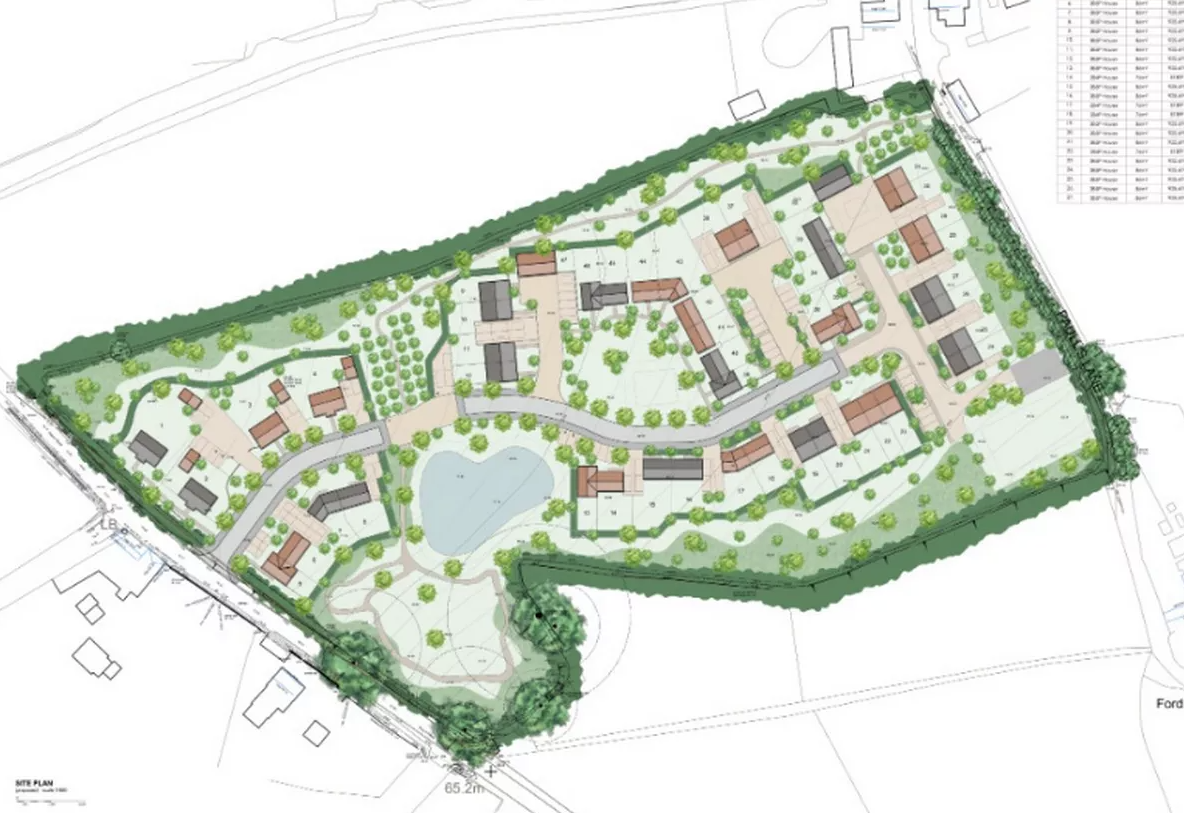CASE STUDIES
Mudford, Yeovil - Achieving Phosphorus Neutrality
This case study highlights how Enviren’s approach — grounded in updated data, improved SuDS design, and revised permit assumptions—achieves significant phosphorus reductions relative to the Competitor analysis. This case study is based on a 252 dwelling scheme in Mudford, Yeovil, Somerset.
Updated Wastewater Loads
Enviren’s Stage 1 wastewater calculations show the following reductions due to AMP7 and future permit tightening:
- 45.73 kgP/year (Current)
- 13.49 kgP/year (Post-2025)
- 5.72 kgP/year (Post-2030)
This is a dramatic reduction compared with earlier assumptions.
Land-Use Change Calculations
- Existing cereal cropping exports –21.16 kgP/year
- Proposed land-use mix (residential, orchard, greenspace, water + SuDS) results in +5.21 kgP/year
Final Nutrient Budget
Enviren calculates the following final phosphorus budgets:
| Scenario | Final TP Budget |
|---|---|
| Current permit | +35.73 kgP/year |
| Post-2025 | –2.46 kgP/year |
| Post-2030 | –10.24 kgP/year |
Critically, Enviren confirms:
“Development will be Phosphorus neutral – no mitigation will be required.”
This means the site is self-mitigating under foreseeable permit conditions.
Why Enviren Achieves Neutrality (Key Factors)
- AMP7 and Post-2030 discharge limits applied
– Competitor pre-dated these values. - 62% SuDS phosphorus-removal efficiency applied to surface water runoff
– Based on CIRIA C808 - A detailed SuDS treatment train managing both particulate and dissolved phosphorus – Includes sediment capture, wet ponds, and treatment media targeting phosphorus
- Large areas of on-site greenspace (13.144 ha) with low nutrient export rates.
- Cereal land baseline creates a favourable pre-development nutrient position.
Competitor’ Findings: Requirement for Large-Scale Offsite Mitigation
Competitor’ assessment arrives at dramatically different conclusions.
Total Phosphorus Budget
Competitor calculates a positive phosphorus budget of +50.99 kgP/year, requiring mitigation:
“Mitigation measures will be required to offset additional 50.99 kgP/year discharged from the site…”
This figure is significantly higher than Enviren’s positive current-permit budget of +35.73 kgP/year—and far higher than the mitigation-free negative budgets under 2025/2030 limits.
Competitor’ Proposed Mitigation Requirements
The competitor identifies offsite mitigation options due to the scale of the +50.99 kgP/year load:
Option 1 – Fallowing
- 72 ha of lowland grazing, or
- 57 ha of cereal fields
required to offset the load.
Option 2 – Constructed Wetlands
- A 4.25 ha traditional wetland, or
- 1.1 ha of floating wetland
required to offset the phosphorus load.
The competitor therefore concludes that significant offsite land or complex engineered wetlands are necessary—whereas Enviren determines that no mitigation is needed at all.
Key Comparative Insight: The Reduction Achieved by Enviren
Enviren vs. Competitor: Final TP Loads
| Assessment | Final TP Load | Mitigation Required? |
|---|---|---|
| Competitor | +50.99 kgP/year | Yes – extensive land or wetlands |
| Enviren (Current Permit) | +35.73 kgP/year | Potentially |
| Enviren (Post-2025) | –2.46 kgP/year | No |
| Enviren (Post-2030) | –10.24 kgP/year | No |
Total effective reduction achieved by Enviren (Competitor → Post-2030):
≈ 61.23 kgP/year reduction
This reduction is achieved through:
- incorporating newer WRC permit limits
- enhanced SuDS phosphorus reductions
- refined land-use modelling
- updated rainfall and catchment data
- more accurate cereal-land baselines
Conclusion
Enviren’s 2025 Nutrient Neutrality Assessment transformed the development prospects for the Mudford Road site. Earlier assessments had suggested that the site would generate over 50 kg of additional phosphorus per year, requiring up to 72 hectares of offsite land or extensive artificial wetlands.
Using updated wastewater permit limits, improved SuDS design, and refined nutrient modelling, Enviren demonstrated that the scheme can achieve full phosphorus neutrality on site, reducing the phosphorus impact to –10.24 kgP/year under post-2030 conditions.
This represents an effective reduction of more than 60 kgP/year compared with the previous assessment—eliminating the need for costly offsite land purchase or wetland construction and significantly accelerating deliverability.
PROJECT DETAILS
CLIENT
Private Developer
LOCATION
Yeovil
OFFICE
Bristol
COMPLETED
2025



